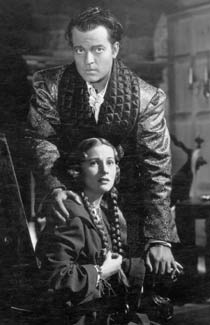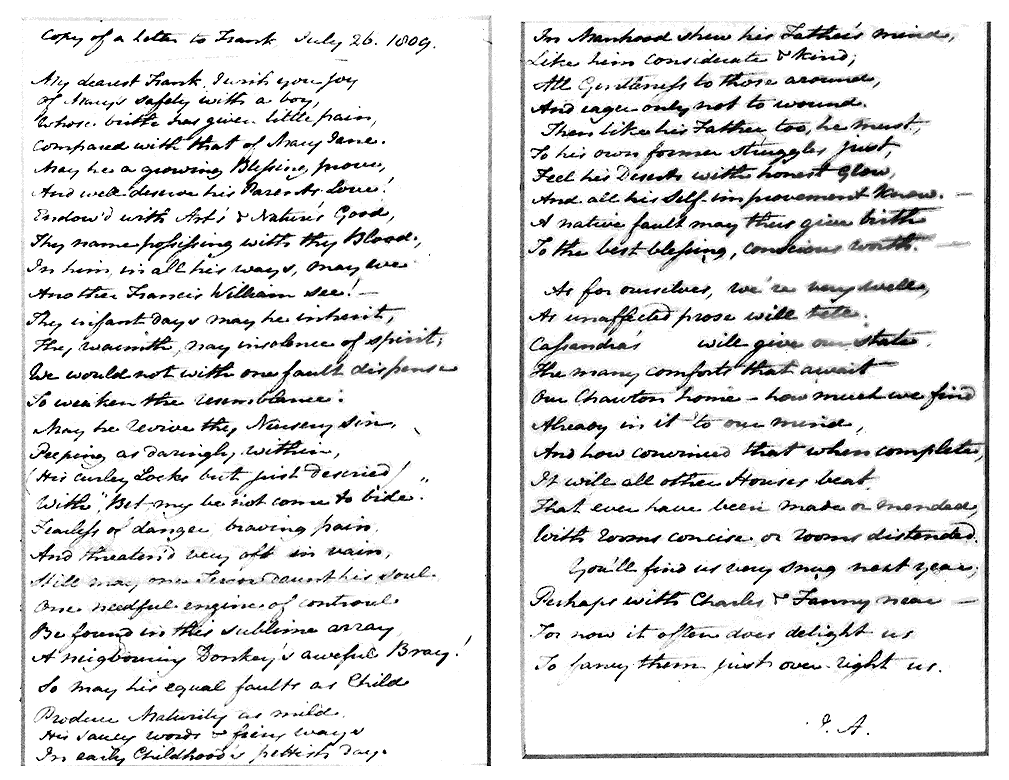This is an earlier post that I recently referenced, so here it is again:
I've seen seven
Jane Eyres, including a horrible 1934 version that bears so little resemblance to the actual story, you wonder why they bothered to keep the title.

The Orson Welles' version (1943) is, naturally, definitive, mostly because Orson Welles
is Rochester. My biggest problem with this version is Joan Fontaine. She looks so thoroughly like the nice-girl-next-door, I never fully believe in her character's persona: a somewhat eccentric, 18-year-old whose passionate otherworldiness will attract Rochester despite his good intentions. While Orson Welles is growling and bettling his brows and running about in gorgeous (and well-fitted) dressing gowns, I keep expecting Joan Fontaine to say, "Oh, and when did you want your washing done, honey?"
Of the three movies (2011, Michael Fassbender as Rochester; 1997 Ciaran Hinds as Rochester; 1996, William Hurt as Rochester), I prefer William Hurt's Rochester, just because I like William Hurt. And I like Samuel West who plays Rivers in that version.
But both BBC series beat them all for several reasons.
BBC Series: 1983
The casting is excellent. It seems totally wrong at first. Timothy Dalton is a really handsome guy, and Rochester isn't supposed to be. He's supposed to be, well, Orson Welles: striking looks and dark glances and stocky broodiness. Yet Timothy Dalton pulls all that off through sheer, magnificent acting. He's not too pretty, despite being handsome, and he builds on that. He's also a very big guy. I tend to associate him with James Bond, which is a mistake. Bond is all sauve elegance. Dalton can hulk about with the best of them.
The actress (Zelah Clarke) who plays Jane is also excellent. She plays Jane as more matter-of-fact than she comes across in the book, but she also captures Jane's tapped-down passion. She is also perfect in appearance, being small, slight with a pair of gorgeous eyes and very fine features. She isn't really pretty but she isn't really not. The only snag is that despite her flawless skin and extremely youthful features, she's not 18. Everytime I see the movie, I try to pretend she's 18 for about 1/3 of the movie until I think, "She's got to be 30 at least." It's in her bearing and her voice. She moves and talks like an adult, not a somewhat gawky, if reserved, teenager.
But the series still works. Age is not as great an issue in
Jane Eyre as class and oh, yeah, that crazy woman in the attic. I just give up thinking she's 18 and figure this is the story of two people in their 30s and hey, why not. Jane taught at Lorwood for another ten years, instead of two. In the end, the viewer ends up believing that these two odd people from very different backgrounds are soulmates, which is all that matters.
The second thing the 1983 series does right is the scene with the gypsy. The movie versions tend to excise this scene since it is so bizarre and seems so exploitative. Basically, the gypsy is Rochester trying to pump Jane for information. Yeah, it does sound weird, but it makes perfect sense if Rochester is done right. Dalton does Rochester right.
In most versions, Rochester is damped down (except in Orson Welles's version but really, the Orson Welles's version is all about Orson Welles; it isn't about Jane) or nicened up. But he can't be. He's a weird guy. Jane loves him because he's weird. She's weird too. They're weird together. In order for Rochester to make any sense, he has to be played as a disillusioned idealist who has decided to be a rake and is really, really bad at it. He wants desperately for Jane to meet him half-way in his plan to make her his lover. But she won't, being too young (this is where the youth quotient matters), too inexperienced and too much of an idealist herself. Which he knows. So he gives up and just lies to her. But the first half of the book (and movie) only make sense if Rochester comes off as uncertain of Jane and of himself, no matter how much he blusters. He's a man who is very cocky when he gets what he wants but is intensely unsure of himself up until that point. (Although he gets so cocky when he gets what he wants that he has to fall off a burning building and lose his sight before Jane will put up with him for the long-term.)

Lastly, the 1983 series does Rivers absolutely, magnificently right. Samuel West does Rivers as a somewhat overly serious but still appealing guy. Which is fine. But it also misses the whole point of Rivers. In the 1983 version, he is played by Andrew Bicknell who is a blond, tall, extremely handsome guy without a single hint of cuteness or prettiness. Thirty years earlier, he would have played the Nazi commander in every single British war movie. In other words, he's kind of scary. And he's supposed to be.
The point of Rivers is his contrast to Rochester. Rochester is cocky, insecure, brusque and kind of crazy. Rivers is utterly self-confident, logical and manipulative. With Rochester, Jane thrives. She argues, debates, threatens, talks back and eventually, makes her own decisions. With Rivers, Jane wilts. She nearly loses her self-will. And the point is clear: as William Hurt says in
Accidental Tourist,
"It isn't how much you love someone. It's the kind of person you are when you're around them."
With his virtue and his in-your-face idealism, Rivers ought to be right for Jane (plus he doesn't have a crazy wife), but he isn't, and she isn't willing to settle for ought-to-be right. Rochester, despite lying to her and pressuring her, is still someone Jane enjoys being with. This isn't some Harlequin Romance where the hero's passion excuses his behavior. This is
Jane Eyre where the hero's character, in the long run, excuses his passion or, rather, disciplines it. He is Jane's friend, and she knows it, and for a novel written in 1847 that declaration of equal friendship is extraordinarily lovely. (Yeah, yeah, I'm a romantic.)
I review the 2006 series here.













